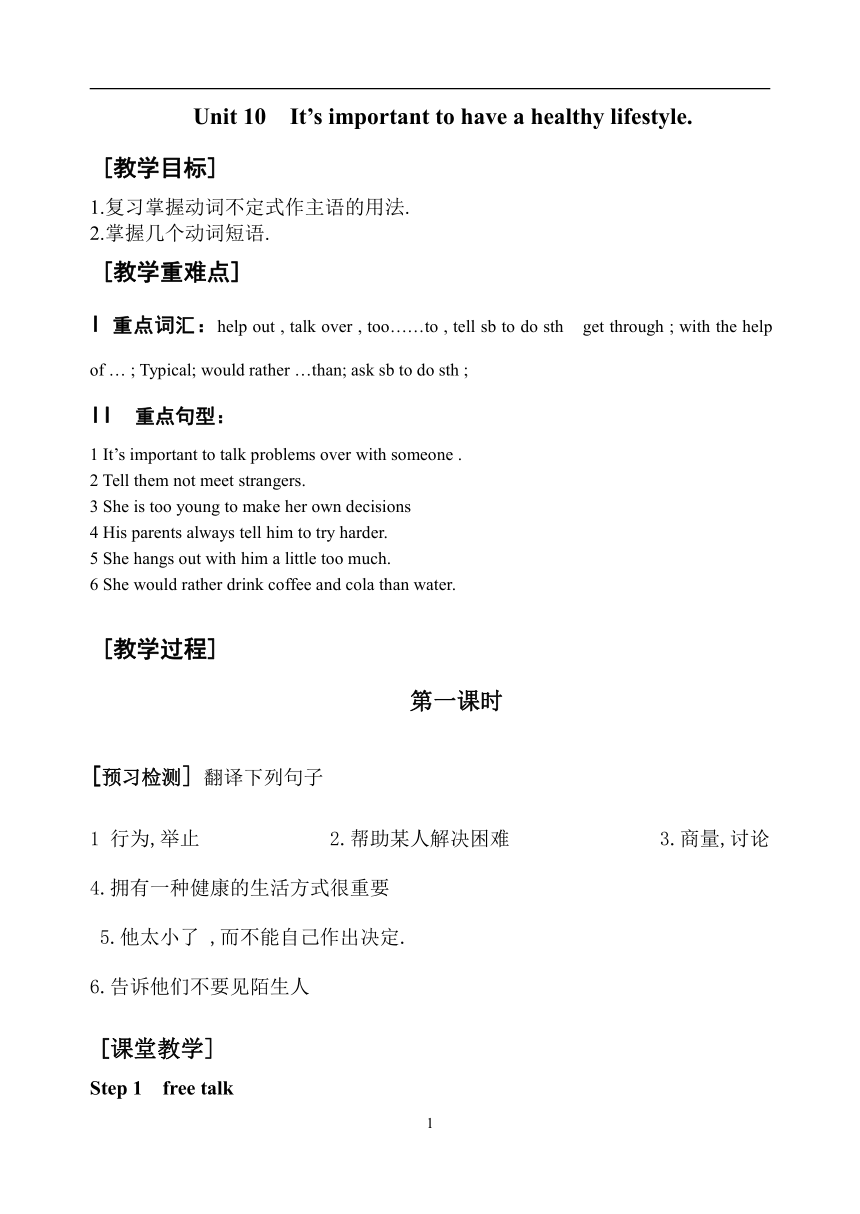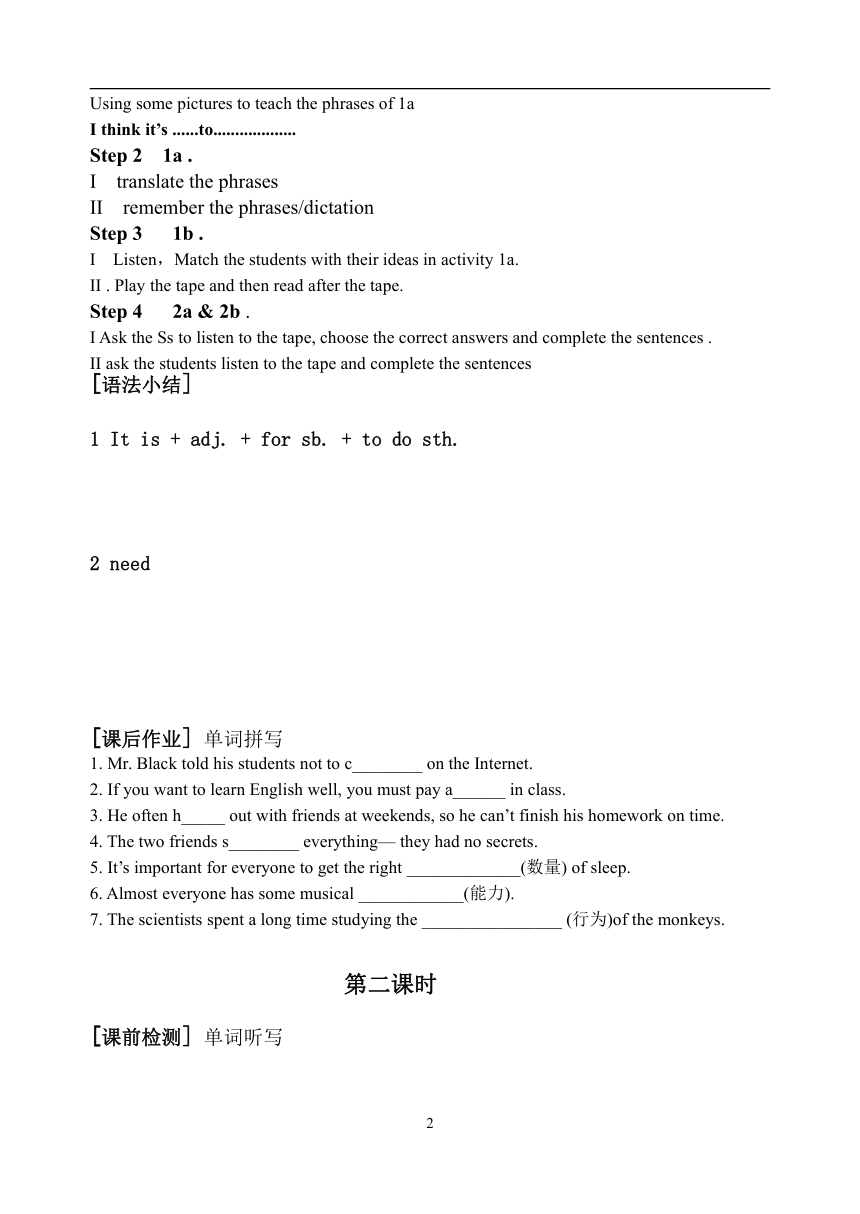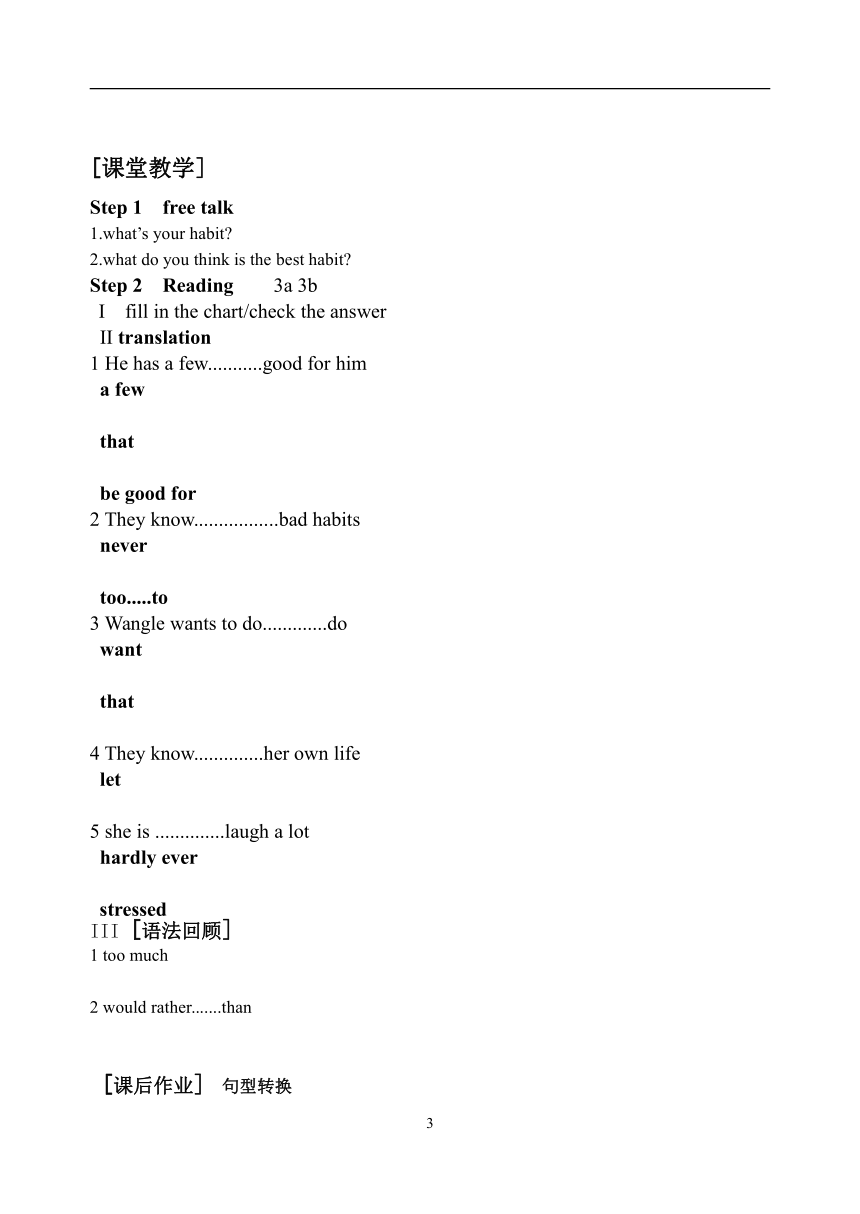Unit 10 It’s important to have a healthy lifestyle导学案(6课时)
文档属性
| 名称 | Unit 10 It’s important to have a healthy lifestyle导学案(6课时) |

|
|
| 格式 | zip | ||
| 文件大小 | 19.2KB | ||
| 资源类型 | 教案 | ||
| 版本资源 | 鲁教版(五四学制) | ||
| 科目 | 英语 | ||
| 更新时间 | 2014-03-07 17:15:15 | ||
图片预览




文档简介
Unit 10 It’s important to have a healthy lifestyle.
[教学目标]
1.复习掌握动词不定式作主语的用法.
2.掌握几个动词短语.
[教学重难点]
I 重点词汇:help out , talk over , too……to , tell sb to do sth get through ; with the help of … ; Typical; would rather …than; ask sb to do sth ;
II 重点句型:
1 It’s important to talk problems over with someone .
2 Tell them not meet strangers.
3 She is too young to make her own decisions
4 His parents always tell him to try harder.
5 She hangs out with him a little too much.
6 She would rather drink coffee and cola than water.
[教学过程]
第一课时
[预习检测] 翻译下列句子
1 行为,举止 2.帮助某人解决困难 3.商量,讨论
4.拥有一种健康的生活方式很重要
5.他太小了 ,而不能自己作出决定.
6.告诉他们不要见陌生人
[课堂教学]
Step 1 free talk
Using some pictures to teach the phrases of 1a
I think it’s ......to...................
Step 2 1a .
I translate the phrases
II remember the phrases/dictation
Step 3 1b .
I Listen,Match the students with their ideas in activity 1a.
II . Play the tape and then read after the tape.
Step 4 2a & 2b .
I Ask the Ss to listen to the tape, choose the correct answers and complete the sentences .
II ask the students listen to the tape and complete the sentences
[语法小结]
1 It is + adj. + for sb. + to do sth.
2 need
[课后作业] 单词拼写
1. Mr. Black told his students not to c________ on the Internet.
2. If you want to learn English well, you must pay a______ in class.
3. He often h_____ out with friends at weekends, so he can’t finish his homework on time.
4. The two friends s________ everything— they had no secrets.
5. It’s important for everyone to get the right _____________(数量) of sleep.
6. Almost everyone has some musical ____________(能力).
7. The scientists spent a long time studying the ________________ (行为)of the monkeys.
第二课时
[课前检测] 单词听写
[课堂教学]
Step 1 free talk
1.what’s your habit
2.what do you think is the best habit
Step 2 Reading 3a 3b
I fill in the chart/check the answer
II translation
1 He has a few...........good for him
a few
that
be good for
2 They know.................bad habits
never
too.....to
3 Wangle wants to do.............do
want
that
4 They know..............her own life
let
5 she is ..............laugh a lot
hardly ever
stressed
III [语法回顾]
1 too much
2 would rather.......than
[课后作业] 句型转换
1. To exercise is very important. (变为同义句)
_______ _______ very important _______ ___________.
2. I don’t know how I can study math well. (变为同义句)
I don’t know how ________ _______ math well.
3. Li Hua decided to move to Beijing when she was thirty. (变为同义句)
Li Hua made a ________ _______ move to Beijing ______ the age of thirty.
4. Jim is the tallest boy in his class. (变为同义句)
Jim is _______ ______ ______ _____ ______ in his class.
5. “Don’t talk in class”, my teacher said. (变为同义句)
My teacher told me ______ ______ ______ in class.
第三课时
[预习检测] 翻译句子
1. 现在你比以前吃得更健康吗?
Do you eat _______ _______ now than before
2. 老师告诉我们不要抄袭别人的作业。
The teacher told us _______ ______ ____ the homework of others.
3. 我认为莉莉不如露西学习认真。
I don’t think Lily studies _________ _______ _______ Lucy.
4. 你说的越多,我们越不明白。
_______ _______ you spoke, _______ _________ we understood.
5. 请尽快完成你的作文。
Please finish your composition _______ _______ ______ _______.
[课堂教学]
Step 1a & 1b .
Use three pictures to teach this dialogue:
-------In order to keep healthy, what do teenagers need to do
-------They need to …
Step2 Listening , 2a & 2b .
I Play the tape for the first time, let SS only listen.
II Then play the tape again, this time Ss complete the sentences.
Step 3 Pairwork 2c .
In pairs ,students role play conversations using the information from activity 2a and 2b .Then ask some pairs to present their dialogue to the class .
[课后作业] 用所给词的适当形式填空
1. Don’t forget ______________(turn ) off the lights after school.
2. She would rather ________(learn) French than Japanese.
3. The old man is too old __________________(walk).
4. Not ______________(get) enough sleep has serious effects on our brain’s ability to work.
5. If you have trouble ________(solve) the problem, please let me know.
6. His father didn’t allow him _____________(watch) TV on weekends.
第四课时
[预习检测] 单词听写
[课堂教学]
Step 1 free talk
Talk about healthy life
Step 2 Reading 3a .
I check the things you do
II [短语回顾]
1 talk sb. Sth
2 try
3 or
4 as....as
5 interest
6 share
[语法讲解]
祈使句
Step 3 Writing 3c
Write about the changes
[课后作业] selfcheck 1
第五课时(Reading)
[课堂教学]
Step 1 Free talk
1 how many hours do you sleep every day
2 what will happen if people do not have enough sleep
Step 2 3a 3b
1 check the information
2 tell the main idea of each paragraph
Step 3 [语法讲解]
1 the truth is..................to sleep
truth
agree
2 even a ten-minute nap.............in the afternoon
ten-minute
allow
3 not getting enough sleep.........................to work
not
effect
4 sleep experts say that...................at the time
That
It
Try
Too..to
[课后作业]同步训练
第六、七课时(Review)
Step 1 selfcheck
I do exercises and translate
II [短语回顾]
1 used
2 help
3 need
4 afraid
5 angry
6 let
step 2 grammar
动词不定式在句中可充当主语、表语、宾语、宾补、定语和状语等。
一、作主语
动词不定式作主语可位于句首。例如:
To learn a skill is very important for everyone in society.
也可使用it作形式主语,而将其置于句末。例如:
It is necessary for young students to learn a foreign language.
动词不定式作主语的常用句型有:
1. It is+adj./ n. (+for sb./sth.) + to do sth.
用于此句型的形容词有:easy, hard, difficult, possible, important, impossible, necessary, good, bad, exciting, interesting, surprising等。
考例1:Is ____ possible to fly to the moon in a spaceship (88 MET)
A. now B. man C. that D. it
用于此句型的名词有:pity, shame, pleasure, one’s duty, one’s job, fun, joy, good manners, bad manners等。
2. It is+adj.+of sb.+to do sth.
该句型中只能使用描述某人的品德、特征的形容词,如: kind, nice, wise, silly, polite, impolite, friendly, foolish, clever等。
3. It takes sb.+some time+to do sth.
该句型意为“做某事花费某人多长时间”。
二、作表语
动词不定式作表语常用于以下结构:My wish/ job/ aim/ goal is…及The next step/ measure is …等。
三、作宾语
常见的只能使用动词不定式作宾语的动词有:agree, choose, decide, hope, fail, wish, refuse, expect, manage, plan, intend, pretend, promise, offer, afford, demand, arrange等。
believe, think, consider, feel, make等动词可用于“动词+ it +adj. / n+to do sth.”句型,其中使用it作形式宾语,而将真正的宾语动词不定式置于句末。
四、作宾补
可后接动词不定式作宾补的动词有:advise, allow, ask, hear, order, see, tell, want, wish, watch等。believe, consider, count, declare, deny, feel, find, guess, imagine, judge, know, prove, realize, suppose, think等动词后可接to be型不定式作宾补。 hope, demand, suggest等动词不能后接动词不定式作宾补。例如:
【误】I hope my son to be back soon.
【正】I hope my son will be back soon.
【误】She suggests us to have a discussion about it.
【正】She advises us to have a discussion about it.
【正】She suggests that we (should) have a discussion about it.
在主动结构中,下列动词后作宾补的动词不定式应省略to:“五看”(see, watch, notice, observe, look at)“三使”(make, let, have)“两听”(hear, listen to)“一感觉”(feel)。
但是,改为被动结构后,应补出省略的to。
五、作定语
动词不定式作定语,应位于所修饰词语之后,即:作后置定语。例如:
Have you got anything to eat (to eat修饰anything,位于其后)
下列名词后常接动词不定式作定语:ability, attempt, chance, courage, decision, effort, failure, promise, way, wish等。由only, first, last, next以及序数词或形容词最高级修饰的名词后,也常接不定式作定语。
六、作状语 动词不定式作状语,可表示目的、原因、结果或条件。
作目的状语,还可以使用in order to或so as to。结果状语还可以使用enough to, too…to…, so…as to, such… as to等结构。
8
[教学目标]
1.复习掌握动词不定式作主语的用法.
2.掌握几个动词短语.
[教学重难点]
I 重点词汇:help out , talk over , too……to , tell sb to do sth get through ; with the help of … ; Typical; would rather …than; ask sb to do sth ;
II 重点句型:
1 It’s important to talk problems over with someone .
2 Tell them not meet strangers.
3 She is too young to make her own decisions
4 His parents always tell him to try harder.
5 She hangs out with him a little too much.
6 She would rather drink coffee and cola than water.
[教学过程]
第一课时
[预习检测] 翻译下列句子
1 行为,举止 2.帮助某人解决困难 3.商量,讨论
4.拥有一种健康的生活方式很重要
5.他太小了 ,而不能自己作出决定.
6.告诉他们不要见陌生人
[课堂教学]
Step 1 free talk
Using some pictures to teach the phrases of 1a
I think it’s ......to...................
Step 2 1a .
I translate the phrases
II remember the phrases/dictation
Step 3 1b .
I Listen,Match the students with their ideas in activity 1a.
II . Play the tape and then read after the tape.
Step 4 2a & 2b .
I Ask the Ss to listen to the tape, choose the correct answers and complete the sentences .
II ask the students listen to the tape and complete the sentences
[语法小结]
1 It is + adj. + for sb. + to do sth.
2 need
[课后作业] 单词拼写
1. Mr. Black told his students not to c________ on the Internet.
2. If you want to learn English well, you must pay a______ in class.
3. He often h_____ out with friends at weekends, so he can’t finish his homework on time.
4. The two friends s________ everything— they had no secrets.
5. It’s important for everyone to get the right _____________(数量) of sleep.
6. Almost everyone has some musical ____________(能力).
7. The scientists spent a long time studying the ________________ (行为)of the monkeys.
第二课时
[课前检测] 单词听写
[课堂教学]
Step 1 free talk
1.what’s your habit
2.what do you think is the best habit
Step 2 Reading 3a 3b
I fill in the chart/check the answer
II translation
1 He has a few...........good for him
a few
that
be good for
2 They know.................bad habits
never
too.....to
3 Wangle wants to do.............do
want
that
4 They know..............her own life
let
5 she is ..............laugh a lot
hardly ever
stressed
III [语法回顾]
1 too much
2 would rather.......than
[课后作业] 句型转换
1. To exercise is very important. (变为同义句)
_______ _______ very important _______ ___________.
2. I don’t know how I can study math well. (变为同义句)
I don’t know how ________ _______ math well.
3. Li Hua decided to move to Beijing when she was thirty. (变为同义句)
Li Hua made a ________ _______ move to Beijing ______ the age of thirty.
4. Jim is the tallest boy in his class. (变为同义句)
Jim is _______ ______ ______ _____ ______ in his class.
5. “Don’t talk in class”, my teacher said. (变为同义句)
My teacher told me ______ ______ ______ in class.
第三课时
[预习检测] 翻译句子
1. 现在你比以前吃得更健康吗?
Do you eat _______ _______ now than before
2. 老师告诉我们不要抄袭别人的作业。
The teacher told us _______ ______ ____ the homework of others.
3. 我认为莉莉不如露西学习认真。
I don’t think Lily studies _________ _______ _______ Lucy.
4. 你说的越多,我们越不明白。
_______ _______ you spoke, _______ _________ we understood.
5. 请尽快完成你的作文。
Please finish your composition _______ _______ ______ _______.
[课堂教学]
Step 1a & 1b .
Use three pictures to teach this dialogue:
-------In order to keep healthy, what do teenagers need to do
-------They need to …
Step2 Listening , 2a & 2b .
I Play the tape for the first time, let SS only listen.
II Then play the tape again, this time Ss complete the sentences.
Step 3 Pairwork 2c .
In pairs ,students role play conversations using the information from activity 2a and 2b .Then ask some pairs to present their dialogue to the class .
[课后作业] 用所给词的适当形式填空
1. Don’t forget ______________(turn ) off the lights after school.
2. She would rather ________(learn) French than Japanese.
3. The old man is too old __________________(walk).
4. Not ______________(get) enough sleep has serious effects on our brain’s ability to work.
5. If you have trouble ________(solve) the problem, please let me know.
6. His father didn’t allow him _____________(watch) TV on weekends.
第四课时
[预习检测] 单词听写
[课堂教学]
Step 1 free talk
Talk about healthy life
Step 2 Reading 3a .
I check the things you do
II [短语回顾]
1 talk sb. Sth
2 try
3 or
4 as....as
5 interest
6 share
[语法讲解]
祈使句
Step 3 Writing 3c
Write about the changes
[课后作业] selfcheck 1
第五课时(Reading)
[课堂教学]
Step 1 Free talk
1 how many hours do you sleep every day
2 what will happen if people do not have enough sleep
Step 2 3a 3b
1 check the information
2 tell the main idea of each paragraph
Step 3 [语法讲解]
1 the truth is..................to sleep
truth
agree
2 even a ten-minute nap.............in the afternoon
ten-minute
allow
3 not getting enough sleep.........................to work
not
effect
4 sleep experts say that...................at the time
That
It
Try
Too..to
[课后作业]同步训练
第六、七课时(Review)
Step 1 selfcheck
I do exercises and translate
II [短语回顾]
1 used
2 help
3 need
4 afraid
5 angry
6 let
step 2 grammar
动词不定式在句中可充当主语、表语、宾语、宾补、定语和状语等。
一、作主语
动词不定式作主语可位于句首。例如:
To learn a skill is very important for everyone in society.
也可使用it作形式主语,而将其置于句末。例如:
It is necessary for young students to learn a foreign language.
动词不定式作主语的常用句型有:
1. It is+adj./ n. (+for sb./sth.) + to do sth.
用于此句型的形容词有:easy, hard, difficult, possible, important, impossible, necessary, good, bad, exciting, interesting, surprising等。
考例1:Is ____ possible to fly to the moon in a spaceship (88 MET)
A. now B. man C. that D. it
用于此句型的名词有:pity, shame, pleasure, one’s duty, one’s job, fun, joy, good manners, bad manners等。
2. It is+adj.+of sb.+to do sth.
该句型中只能使用描述某人的品德、特征的形容词,如: kind, nice, wise, silly, polite, impolite, friendly, foolish, clever等。
3. It takes sb.+some time+to do sth.
该句型意为“做某事花费某人多长时间”。
二、作表语
动词不定式作表语常用于以下结构:My wish/ job/ aim/ goal is…及The next step/ measure is …等。
三、作宾语
常见的只能使用动词不定式作宾语的动词有:agree, choose, decide, hope, fail, wish, refuse, expect, manage, plan, intend, pretend, promise, offer, afford, demand, arrange等。
believe, think, consider, feel, make等动词可用于“动词+ it +adj. / n+to do sth.”句型,其中使用it作形式宾语,而将真正的宾语动词不定式置于句末。
四、作宾补
可后接动词不定式作宾补的动词有:advise, allow, ask, hear, order, see, tell, want, wish, watch等。believe, consider, count, declare, deny, feel, find, guess, imagine, judge, know, prove, realize, suppose, think等动词后可接to be型不定式作宾补。 hope, demand, suggest等动词不能后接动词不定式作宾补。例如:
【误】I hope my son to be back soon.
【正】I hope my son will be back soon.
【误】She suggests us to have a discussion about it.
【正】She advises us to have a discussion about it.
【正】She suggests that we (should) have a discussion about it.
在主动结构中,下列动词后作宾补的动词不定式应省略to:“五看”(see, watch, notice, observe, look at)“三使”(make, let, have)“两听”(hear, listen to)“一感觉”(feel)。
但是,改为被动结构后,应补出省略的to。
五、作定语
动词不定式作定语,应位于所修饰词语之后,即:作后置定语。例如:
Have you got anything to eat (to eat修饰anything,位于其后)
下列名词后常接动词不定式作定语:ability, attempt, chance, courage, decision, effort, failure, promise, way, wish等。由only, first, last, next以及序数词或形容词最高级修饰的名词后,也常接不定式作定语。
六、作状语 动词不定式作状语,可表示目的、原因、结果或条件。
作目的状语,还可以使用in order to或so as to。结果状语还可以使用enough to, too…to…, so…as to, such… as to等结构。
8
同课章节目录
- Unit 1 When was it invented?
- Section A
- Section B
- Unit 2 Teenagers should be allowed to choose their
- Section A
- Section B
- Unit 3 It must belong to Carla.
- Section A
- Section B
- Unit 4 I like music that I can dance to.
- Section A
- Section B
- Unit 5 You’re supposed to shake hands.
- Section A
- Section B
- Unit 6 Sad movies make me cry.
- Section A
- Section B
- Unit 7 Life is full of the unexpected.
- Section A
- Section B
- Unit 8 We're trying to save the earth!
- Section A
- Section B
- Unit 9 It's important to have good habits.
- Section A
- Section B
- Unit 10 I remember meeting all of you in Grade 6.
- Section A
- Section B
